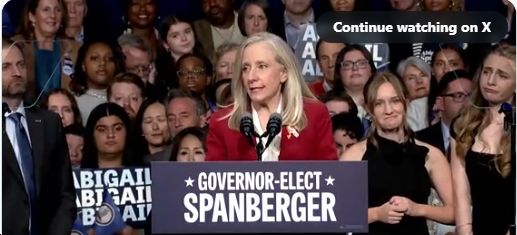From Rep. Abigail Spanberger (D-VA07)’s office:
After Hearing Horror Stories of Air Travel Experiences, Spanberger Leads Effort Urging DOT to Protect Rights of Passengers with Disabilities
Congresswoman & Colleagues: “Passengers with Disabilities Continue to Face Unnecessary and Discriminatory Barriers that Prevent them from Participating in Society on an Equal Basis”
WOODBRIDGE, Va. — After hearing directly from Virginians with disabilities who faced unacceptable treatment, were dropped from their wheelchairs while boarding airplanes, and had their wheelchairs lost or damaged by airlines, U.S. Representative Abigail Spanberger led an effort urging the U.S. Department of Transportation (DOT) to review its enforcement of disability-related violations.
Signed into law in 1986, the Air Carrier Access Act (ACAA) is meant to protect airline passengers with disabilities. However, unlike the Americans with Disabilities Act (ADA), the ACAA does not allow these Americans to enforce their own rights through civil litigation. The only recourse available to passengers under this law is to file a complaint with DOT.
In a letter to U.S. Secretary of Transportation Pete Buttigieg, Spanberger was joined by U.S. Representatives Steve Cohen (D-TN-09) and Dina Titus (D-NV-01) in urging the Secretary to review the enforcement of the ACAA and better protect Americans with disabilities in air travel. Additionally, the lawmakers requested additional information about the process in place to investigate and adjudicate disability-related complaints. The lawmakers also requested information as to how many of the 1,394 disability-related complaints filed in 2021 were dismissed, resulted in a civil monetary penalty, or were otherwise remedied.
“We write to request information regarding your Department’s enforcement of the Air Carrier Access Act (ACAA) out of concern for our constituents and individuals across the nation with disabilities who have experienced discrimination and unacceptable treatment in air travel,” wrote Spanberger and her colleagues. “We have heard horrifying stories from our constituents with disabilities about airlines dropping them from wheelchairs while boarding airplanes, damaging or losing their wheelchairs, and other reproaches to their safety, health, and dignity. Passengers with disabilities continue to face unnecessary and discriminatory barriers that prevent them from participating in society on an equal basis.”
The lawmakers continued, “Our constituents — and all Americans — deserve more. We look forward to your response and working with you to protect the civil rights, safety, and dignity of those we serve with disabilities.”
This Spanberger-led effort to better protect airline passengers with disabilities is supported by the Paralyzed Veterans of America, National Disability Rights Network, Muscular Dystrophy Association, and Easterseals DC MD VA.
“Improving the safety and dignity of air travel for passengers with disabilities, particularly for those who use mobility devices, is a top priority for Paralyzed Veterans of America,” said Heather Ansley, Associate Executive Director of Government Relations, Paralyzed Veterans of America. “We appreciate the efforts of Representatives Spanberger, Cohen, and Titus in requesting critical information about the Department of Transportation’s enforcement of the Air Carrier Access Act, which is important to protecting the safety and dignity of passengers with disabilities.”
“Being able to file a complaint is an important first step. But Americans with disabilities deserve to know that when they report an abuse of their rights, it will be investigated and resolved,” said Marlene Sallo, J.D., Executive Director, National Disability Rights Network. “We thank Reps. Spanberger, Cohen, and Titus for calling for increased transparency from DOT when it comes to enforcement of the Air Carrier Access Act.”
“The Muscular Dystrophy Association applauds efforts by Representatives Spanberger, Titus, and Cohen to secure greater accountability and transparency from the Department of Transportation on how they handle complaints from airline passengers about violations of the Air Carrier Access Act,” said Michael Lewis, Resident of Virginia’s Seventh District and Director of Disability Policy, Muscular Dystrophy Association.
“An average of 28 wheelchairs are damaged daily by airlines, essentially rendering them useless and removing mobility for people with disabilities,” said Larry Bram, Senior Vice President of Innovation & Program Development, Easterseals DC MD VA. “Easterseals supports Congresswoman Spanberger’s call for better enforcement of the Air Carrier Access Act (ACAA) to protect the health, safety, and dignity of Virginians with disabilities. Air travel is the only major mode of public transit that does not allow people with disabilities who use wheelchairs to stay in their chairs. Trains, buses, even taxis have all accommodated wheelchair users with dignity. The discrimination and risks to their health and dignity they face when they travel by air are only compounded by the fear of a loss of mobility they may face because their wheelchairs were damaged in flight.”
Click here to read the letter, and the full letter text is below.
—
Dear Secretary Buttigieg:
Thank you for your service and leadership as Secretary of the U.S. Department of Transportation (DOT).
We write to request information regarding your Department’s enforcement of the Air Carrier Access Act (ACAA) out of concern for our constituents and individuals across the nation with disabilities who have experienced discrimination and unacceptable treatment in air travel. We have heard horrifying stories from our constituents with disabilities about airlines dropping them from wheelchairs while boarding airplanes, damaging or losing their wheelchairs, and other reproaches to their safety, health, and dignity. Passengers with disabilities continue to face unnecessary and discriminatory barriers that prevent them from participating in society on an equal basis.
The ACAA is the primary federal statute governing the rights of passengers during air travel. Since 1986, the law has provided federal protections to airline passengers with disabilities, such as (1) prohibiting discrimination on the basis of disability in air travel; (2) defining requirements regarding the accessibility of aircraft facilities; and (3) ensuring airlines provide certain services and accommodations for these passengers. Unlike the Americans with Disabilities Act (ADA), the ACAA does not expressly provide for a private right of action, thus individuals with disabilities cannot enforce their rights under the ACAA through civil litigation in U.S. courts – which significantly weakens the ACAA’s enforcement. As a result, the only recourse available to these consumers is to file a complaint with the U.S. Department of Transportation.
Our understanding of your Department’s current complaint process with regards to the ACAA is that DOT forwards all disability complaints it receives to the airline accused of a violation, requires the airline to respond to the complaint, reviews the airline’s response, and determines whether to open an investigation by weighing numerous factors, including whether DOT believes an airline is systematically violating civil rights requirements or engaging in particularly egregious conduct. The Department currently publishes the data on disability-related complaints that U.S. and foreign passenger airlines operating to, from and within the U.S. receive during each calendar year; however, DOT has not publicly provided information on how many complaints it has resolved. In addition, the DOT has been silent in response to a growing chorus of complaints regarding the Department’s enforcement of the ACAA.
This lack of transparency is particularly concerning given the rise of disability-related complaints filed with DOT in recent years. In 2021, DOT received 1,394 disability-related complaints, an increase of 54 percent from the 905 disability complaints received in 2019. Although the number of disability-related complaints has increased in recent years, DOT has taken only one enforcement action for non-compliance with applicable accessibility-related regulations for the airline industry since 2019. This is a sharp decrease in the Department’s enforcement actions from the 37 consent orders issued to airlines from 2008 through 2019 for disability-related violations.
Given DOT’s insufficient enforcement activity despite an increase in disability-related complaints, please provide responses to the following questions:
- What is the DOT’s specific process to investigate and adjudicate potential consumer protection violations when it receives an airline’s response to a disability-related complaint?
- What are the criteria used to determine whether the Department will pursue enforcement actions?
- How often is this process evaluated and, if appropriate, amended?
- Of the 1,394 disability-related complaints DOT received in 2021, what percentage of complaints resulted in dismissal, a civil monetary penalty, or other injunctive relief?
- How long did it take to resolve those investigations?
- What steps, if any, is the Department taking to improve its disability-related complaints resolution process?
We appreciate DOT’s recent efforts to strengthen the implementation and enforcement of the ACAA and to implement the accessibility-related provisions required by the FAA Reauthorization Act of 2018. However, our
constituents – and all Americans – deserve more. We look forward to your response and working with you to protect the civil rights, safety, and dignity of those we serve with disabilities.
Thank you for your attention to this important matter.





![[UPDATED] Leaders Jeffries, Schumer Announce Gov. Abigail Spanberger Will Deliver the Democratic Response to Trump’s State of the Union Address on 2/24](https://bluevirginia.us/wp-content/uploads/2026/02/spanbergersotu.jpg)












